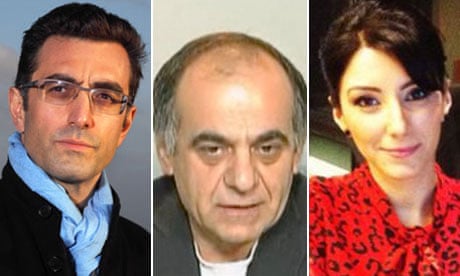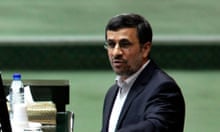Iran has been conducting a smear campaign designed to intimidate Iranian journalists living in exile, including apparent death threats. Cyber-activists linked to the Islamic republic have fabricated news, duplicated Facebook accounts and spread false allegations of sexual misconduct by exiled journalists, while harassment of family members back in Iran has been stepped up by security officials.
Staff at the BBC's Persian service in London are among dozens of Iranian journalists who have been subjected to what appears to be an operation sponsored by the authorities and aimed at discrediting reporters in the eyes of the public in Iran.
It is not the first time the Iranian authorities have resorted to such tactics, but Sadeq Saba, head of BBC Persian, said the number of incidents and level of harassment has increased in the last few weeks.
"In comparison to previous round of harassment, this time the language they were using in Iran [against the family members] was more threatening," he said. According to Saba, members of journalists' families have been summoned to the intelligence service headquarters for questioning. One journalist whose parents were interrogated several times said they were told he should stop working for the BBC or risk being killed.
In recent weeks, the pro-regime activists have set up a number of fake Facebook accounts and blogs, purporting to belong to BBC journalists or their Iranian colleagues. Web users who want to access the real BBCPersian.com, might accidentally visit its counterfeit at persianbbc.ir. The fake site mirrors the BBC's site in design and fonts but has completely different content. "Death of Bin Laden, Saddam Hussein: fabricated stories by Washington," reads the headline of a recent article posted on persianbbc.ir.
Nafiseh Kouhnavard, a presenter on BBC Persian's talkshow Your Turn, is one of the victims. In a fake Facebook account that carries her name and picture, she supposedly confesses to a culture of extramarital relationships among journalists working for the BBC's Persian service. The fake comments attributed to Kouhnavard were reproduced extensively in Iran.
"You wrote about my relationships with my colleagues," she is falsely quoted by a national newspaper in Iran as saying. "Swinging … is not only limited to me, in fact it is common and normal here."
First carried in Vatan-e-Emrooz daily, the fake material has since been republished by state-affiliated news organisations. The fabricated contents are usually chosen carefully to target the most sensitive issues in Iran, especially among conservatives wary of western lifestyles.
In a separate article with a revelatory tone, Vatan-e-Emrooz dedicated a full page to Kouhnavard's life and her work at the BBC, relying on information from the fake accounts.
In the article, titled "network of corruption", the newspaper introduces her as a spy for the British secret service who fled Iran illegally through the mountains with the help of an agent named Ghazanfar. In fact, Ghazanfar is the name of the journalist's rooster doll, often referred to on her real Facebook page. The fake account has now been reported and closed down.
Googling Kouhnavard's name still brings up fabricated news about her, leading to confusion among friends, relatives and genuine fans of her journalism.
Iranian journalists at Radio Farda, the Persian service of Radio Free Europe/ Radio Liberty (RFERL), and several of their freelance colleagues working for independent media have also been targeted.
"Stop writing about Iran, or face the consequence," writes the Iranian journalist Golnaz Esfandiari on her RFERL blog, Persian Letters. "That's the message being sent to Iranian journalists working outside the country, along with warnings that their reputations, finances, and families are at risk should they refuse to comply."
At the BBC, other people have also been targeted, including Pooneh Ghoddoosi, a presenter who has been the subject of slurs live on TV. On one occasion an unknown caller falsely alleged Ghoddoosi had been raped by her boss.
Saba said that in the BBC's case the pressure has escalated after the broadcast in early December of Forced Confessions, a documentary by the Iranian film-maker Maziar Bahari. The documentary tells the story of Bahari and a number of other Iranians who were forced to confess under duress in Iran's prisons.
After questioning family members, Saba said the BBC had become extremely concerned that "Iran is using these tactics to put pressure on innocent people in Iran who are the [targets'] parents and have no control over us".
He said the allegations made in Iran's media are based on fabricated contents or fake accounts and are untrue.
"This is actually an identity theft," he said. "They write whatever they want and they create the impression that they are actually written by BBC staff."
Saba added that he did not believe the majority of people in Iran would believe what they read about the BBC in the Iranian media but insisted the bogus content has created lots of confusion.
Last week, even Baztab, a conservative website, criticised the spread of fabricated contents and said the tactic would backfire.
Saba has not been immune from the campaign. A fake blog set up in his name and with a design that mirrors the look of his BBC blog explains that the corporation's job is not to report news but to make it up.
He told the Guardian: "We try to raise awareness in the international community, they don't know what is happening in Iran. A lot of people are aware of journalists being harassed and killed around the world but a lot of people don't know that in places like Iran, relatives of journalists are also paying a heavy price for the work of their loved ones.
"Despite the pressure, we continue to remain impartial, we continue to remain cool and continue our professional services."
Although loathed by the Iranian government, BBC Persian is popular inside Iran and is watched by millions through illegal satellite dishes installed on rooftops.
According to the New York-based Committee to Protect Journalists (CPJ). Iran is among the world leaders in jailing journalists. More than 30 journalists and bloggers are behind bars in the country, including prominent figures such as Ahmad Zaid-Abadi, Issa Saharkhiz and Massoud Bastani.
CPJ and Reporters Without Borders have repeatedly condemned Iran's campaign of intimidation and smear against its journalists.


